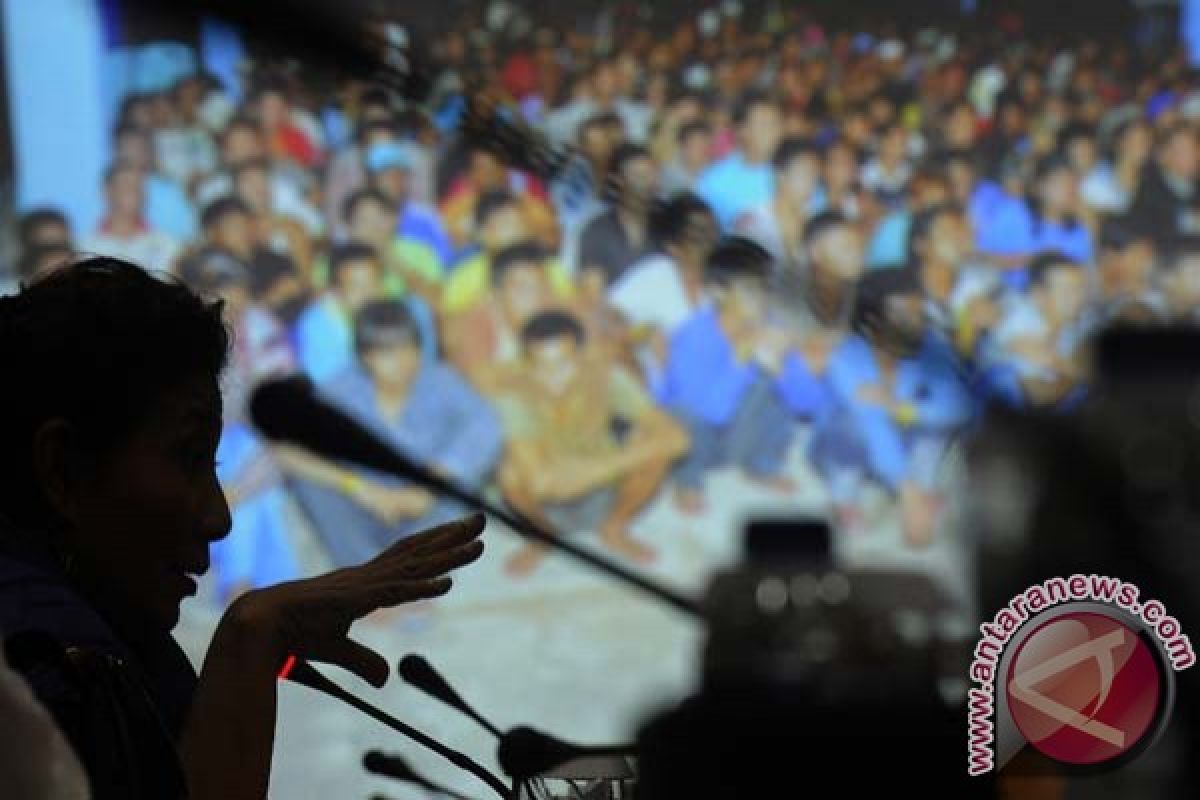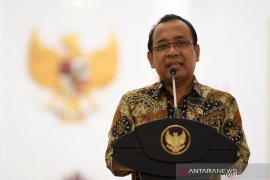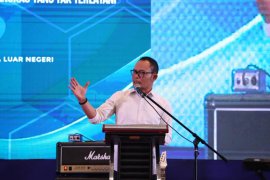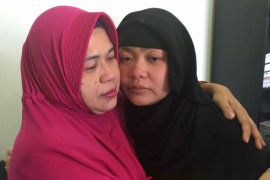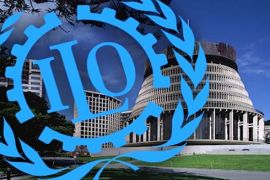We are examining manpower violations while criminal violations are being handled by the police."Jakarta (ANTARA News) - The alleged slavery case by the Thai firm PT Pusaka Benjina Resource (PBR), based in Aru Island, Maluku province, has led to the revelation of other alleged crimes in the maritime and fishery sector.
The Ministry of Manpower is probing indications and investigating alleged slavery practices against the crew members of PT PBRs fishing vessels operating in the waters of Aru Island, Maluku.
"The manpower ministry is still carrying out thorough investigations in the Benjina case. We are examining manpower violations while criminal violations are being handled by the police," Manpower Minister M. Hanif Dhakiri stated after meeting Marine Affairs and Fisheries Minister Susi Pudjiastusi in Jakarta on Monday.
Early this month, several international media outlets such as the Associated Press from the United States had reported about the enslaved boat crew members employed by the company that conducts fishing in Indonesia.
According to the Associated Press, PT PBR, a company based in Benjina on Aru Island in Maluku, an eastern province of Indonesia, had been treating its ships crew members as slaves.
The International Organization for Migration (IOM) revealed that the number of fishermen forced into slavery reaches four thousand. They are reportedly compelled to work as slaves.
However, based on the results of a preliminary investigation, crew members who had been employed for 22 hours a day by the company totaled 1,456, comprising 251 Indonesians and 1,205 foreigners that include 1,196 from Thailand, two from Cambodia, and 20 from Myanmar.
PT PBR is a foreign investment company from Thailand with a fishing operation license issued by the Ministry of Marine Affairs and Fisheries in June 2007.
Minister Dhakiri stated that the investigation into the Benjina case is being conducted in cooperation with the related agencies such as the Directorate General of Immigration of the Ministry of Law and Human Rights, the Ministry of Marine Affairs and Fisheries (KKP), the Ministry of Transportation, and the police.
Dhakiri remarked that his ministry is carrying out intensive investigations by deploying its manpower supervisory officers who are focusing on aspects such as violations regarding labor relations, norms, protection, and foreign worker recruitment license.
He revealed that the types of violations his ministry was investigating included manpower license, working conditions, the likelihood of servitude, violence at the work place, human trade, license for recruiting foreign workers, child labor, occupational health, and safety conditions.
"We emphasize that the Ministry of Manpower will not tolerate any deviation done by companies and will take stern measures based on the regulations in place," remarked Minister Dhakiri.
In the meantime, the Indonesian Traditional Fishermens Association (KNTI) and the Commission on Missing Persons and Victims of Violence (Kontras) stated that the alleged slavery case involving PT PBR had also unveiled other crimes in the marine and fishery sector.
The investigators discovered that the slavery case also exposed other crimes such as bribery and corruption, forgery of license and other documents, human trade, and violation of workers right to health.
"The findings on violations by PT PBR have actually been discovered since 2009, but the company could always obtain a new business operating license every year. We believe that there was omission in this case by the apparatuses," KNTI General Chairman M. Riza Damanik claimed.
He cited the example of Yoseph Sairlela, a coordinator of the Supervision Working Unit of the Dobo Marine Resources and Fisheries in Aru Island.
Damanik noted that Sairlela once served as a mediator between the residents and PT Dafin Mutiara firm when they were embroiled in a conflict on the exploitation of local coastal resources.
Sairlela had reportedly offered compensation to the residents after they were attacked by the military and security officers during a conflict between the company and the locals on November 10, 2013.
Sairlela was a witness in the alleged PT PBR slavery case but was later found dead in a hotel in Menteng, Central Jakarta, several days before he was to be questioned about the alleged slavery case.
Therefore, Kontras and KNTI have urged the police and the government to conduct a thorough investigation on the death of Sairlela, the key witness in the Benjina slavery case.
"We suspect the death of Yoseph Sairlela is linked to the efforts to cover up the Benjina case because it concerns a fishing business competition in Maluku," Haris Azhar, the coordinator for Advocacy of Kontras, noted during a press conference on Sunday.
Earlier, Sr Comr Musyafak, the head of Jakarta Polices Medical and Health Affairs, noted that Yoseph Sairlela had died due to an illness.
"Embolism was found in the blood vessels of Sairlelas heart. The blood vessels were clogged due to cholesterol build-up," he explained.
Musyafak also revealed that based on the autopsy carried out by the Cipto Mangunkusum Hospital, no signs of physical torture were found.
Regarding the alleged bribery case, Riza Damanik of the KNTI remarked that in a report received by the KKP, it was learnt that the marine and fishery resources supervisors often pocketed money for the issuance of the operation worthiness letter (SLO) valued at Rp250 thousand for each fishing boat and Rp4 million for each tramper ship.
"PT PBR set a budget of Rp37 million every month as a baksheesh for its business operations. PBR admitted that the money is given to individuals (security apparatuses and village officials) they claimed to be part of a corporate service responsibility (CSR)," Damanik noted.
He affirmed that PT PBR was also known to have forged various ship fishing documents. At least 96 fishing vessels of PT PBR have false documents and are not registered with the Transportation Ministry.
The State Audit Board (BPK) in its report in 2010 pointed out that 98 fishing business licenses, which are used to recruit foreigners, exceeded the 50 percent limit based on regulations of which one of the licenses belonged to PT PBR.
"A total of 85 foreign crew members of PT PBRs ships were employed illegally and were the victims of human trade," Coordinator for Advocacy of Kontras Haris Azhar meanwhile stated.
He remarked that several crew members had admitted to have faced inhumane actions such as torture, being forced to work for 22 hours, indecent food, or being locked up in a special cell if they committed a mistake.
"Some also claimed that they were not paid and were banned from contacting their family members or relatives in their countries," Azhar emphasized.
The several crew members, who belonged to Myanmar, Thailand, Laos, and Cambodia, were under severe stress and some even often screamed, Azhar added.
(T.A014/INE/KR-BSR/F001)
Reporter: Andi Abdussalam
Editor: Priyambodo RH
Copyright © ANTARA 2015
